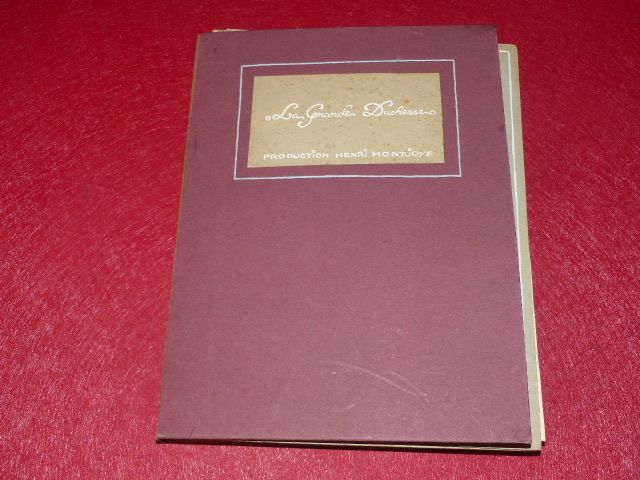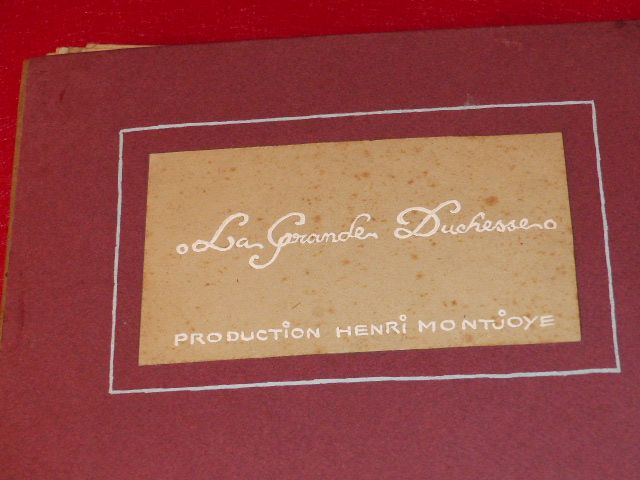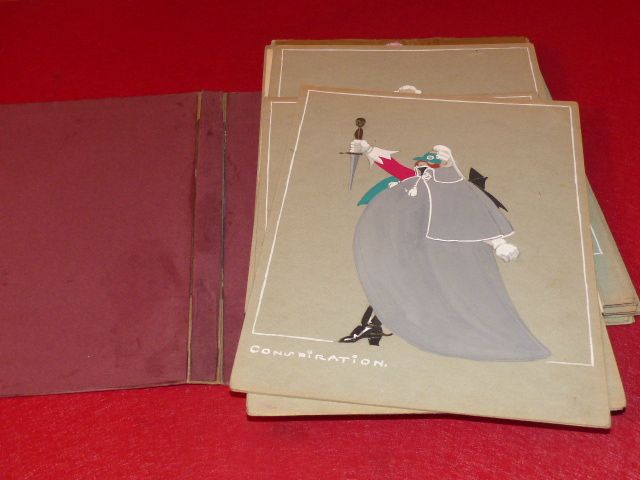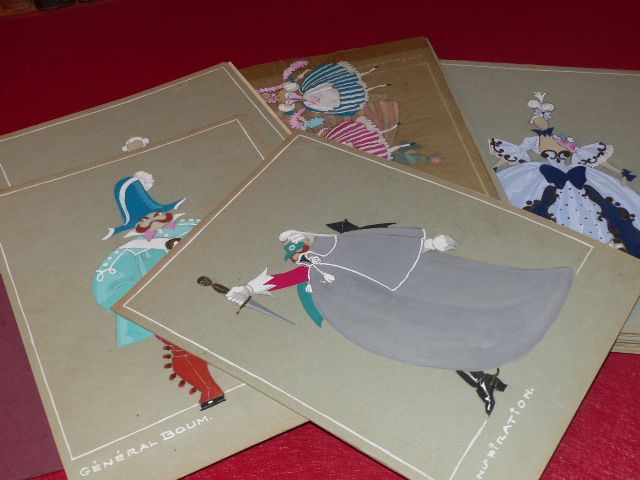Follow on ebay
at auction and in my shop "AmidesLivres"
at the same time as a very beautiful set of rare photographs in period Argentic print
from the personal archives of
Germaine ROGER
Cinema, Operetta, and of course a large number of photographs of the various shows of the
famous Théatre de la Gaîté-Lyrique which she directed after the war
Luis Mariano, André Dassary, Rudy Hirigoyen, Maurice Baquet, Francis Blanche,
the Compagnons de la Chanson, Claudine Cereda &c...&c..., and herself as an actress and lyrical artist
We sell a large set of
Original gouaches
(costumes and sets)
by
HENRY-RAYMOND FOST
(1905-1970)
for Creation in 1948 at the Théâtre de la Gaité Lyrique
from the Opéra-bouffe by Jacques Offenbach
(1819-1880)
The Grand Duchess
by Gerolstein
-
Germaine ROGER
1910-1975
Victoria Calixte Bousquet known as Germaine Roger, born February 12, 1910 in Marseille and died April 20, 1975 in Savigny-sur-Orge, is an operetta singer and theater director.
Biography
After winning a beauty contest in her hometown in 1929, she was admitted as a light soprano to the Marseille Conservatory, then debuted in Paris at the Gaîté-Lyrique. It is then divided between the repertoire (Mam'zelle Nitouche) and creations by Albert Willemetz, Josef Szulc, Georges van Parys,
by Louis Beydts or Maurice Yvain.
She also began a career in cinema and would become the star of Vincent Scotto's operettas brought to the screen: Three from the navy (1934), One from Canebière (1938, where she notably performed The Most Beautiful Tango in the World, in duet with Alibert), The Gangsters of Château d'If (1939).
After the Second World War, Henri Montjoye (Henri Barbero, known as,
having retained the name worn during the Resistance)
and his wife Germaine Roger takes the lead
of TGaité Lyrique Theater.
After the death of her husband in 1950, she succeeded him alone as director until this Parisian temple of operetta was forced to close in 1964 for financial reasons.
As Director of the Théatre de la Gaité Lyrique
numerous revivals or creations of very successful operettas
followed: Colorado (1950 and 1959), The Land of Smiles (1951 and 1957), The Musketeers at the Convent (1952 and 1957), Three Waltzes (1952 and 1959), The Bells of Corneville (1953 and 1958), Mam' zelle Nitouche (1954 and 1960), Chanson Gitane, Andalusie, Pampanilla (1954), Chevalier du ciel (1955), Minnie Mustache (1956), Romance in Portugal (new version of Portuguese Symphony (1958), Premier Rendez-vous (1959 ), La Chaste Suzanne (1960), Visa pour l’amour (1961)
Works given with a great cast: Luis Mariano, André Dassary, Rudy Hirigoyen, Jean Bretonnière, Les Compagnons de la chanson, Armand Mestral, Maurice Baquet, Rellys, Duvaleix, Annie Cordy, Germaine Roger, Andrée Grandjean, Gise Mey, Ginette Baudin…
-
Music of
Jacques OFFENBACH
The Grand Duchess
Reprise at the Gaîté-Lyrique Theater
Date of the 1st
Tuesday November 16, 1948
Operetta in 3 acts and 5 scenes; libretto by Meilhac and Halévy -
New version by Albert Willemetz and André Mouezy-Eon;
Directed by Louis Musy and Henri Montjoye
Distribution : Germaine Roger, Grand Duchess and Wanda: Jeanne Perriat, Baroness Ortrude; Jacques Jansen, Frantz; Marcel Vallée, General Boum; Jack Claret, Prince Paul; Léo Bardollet, Baron Puck; Henri Despuech, Népomuc; Simonne Cordat, Iza; Renée Horsch, Amélie; Cécilia Bert, Olga; Jany Dujour, Charlotte
Corps de ballet of lyrical gaiety and little rats
Dances regulated by Corbay
Conductor: Marcel Cariven
Sets and costumes by Raymond FOST
.
We sell here a
Beautiful original drawing in pencil and gouache
on strong gray-blue paper
(light cardboard)
[59]
Format
Large sheet approximately 32 x 24 cm
+ 1 separate piece:
Frame ornaments approximately 15 x 11.5 cm (folded)
"DECORAL ELEMENTS - SCENE - PROSCENIUM - FRAME"
1948
Unsigned drawing,
by Henry-Raymond FOST
Good general condition, clean
usual frictions various minors
and various traces of handling
see visuals...
Very Rare and very beautiful document
-
As always, combined shipping costs when purchasing several books or documents...
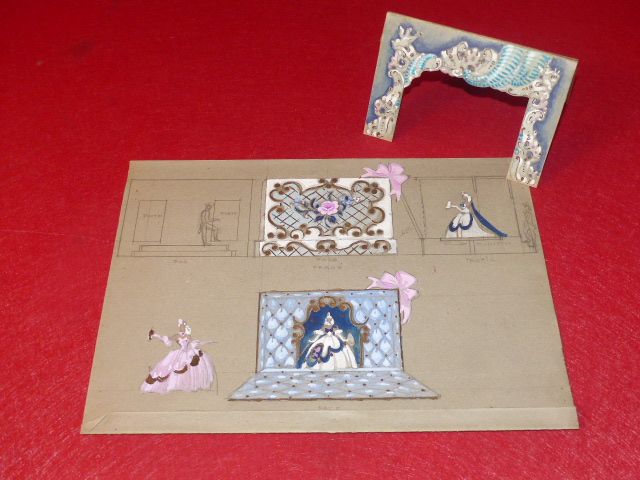
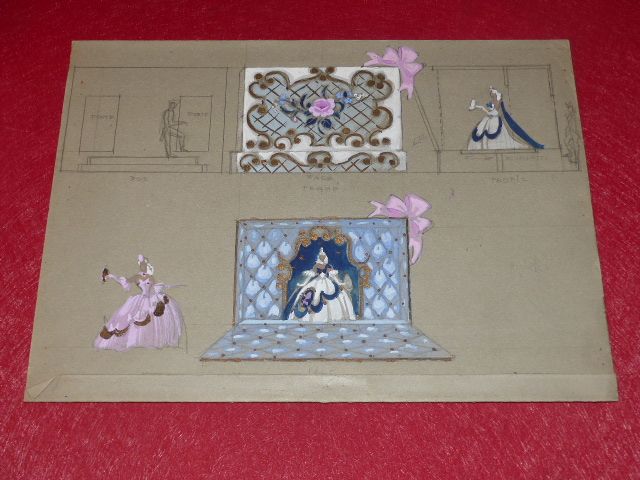
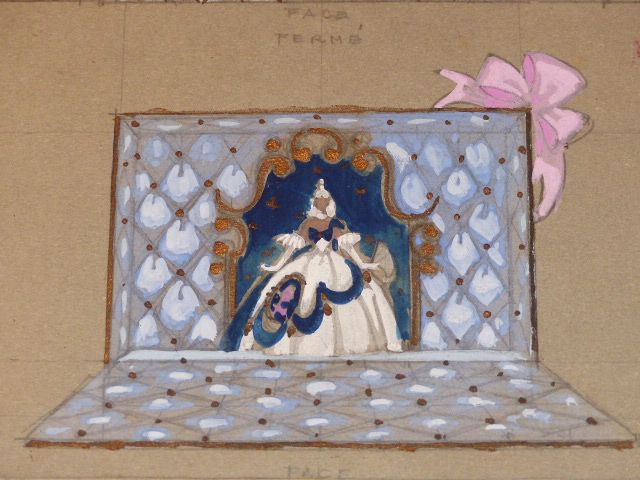
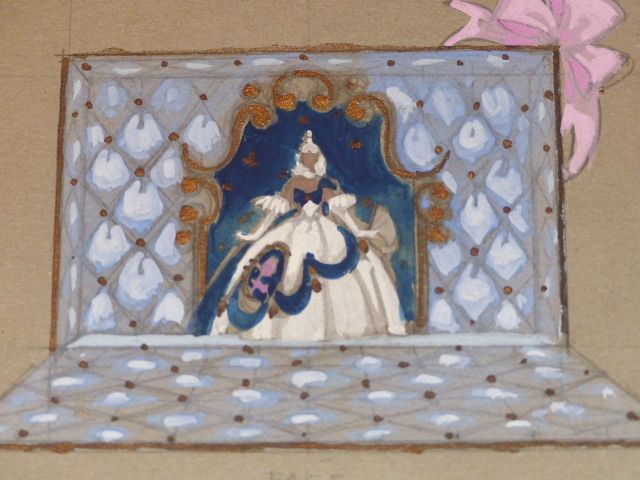
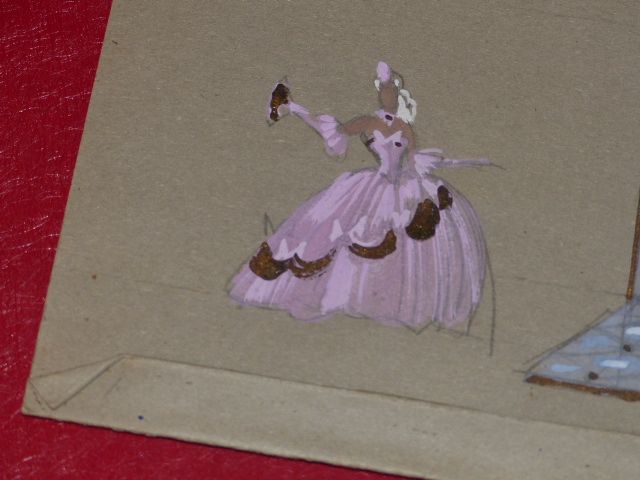
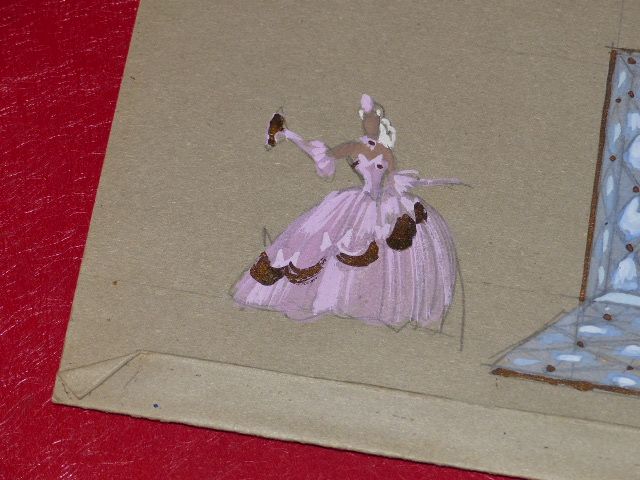
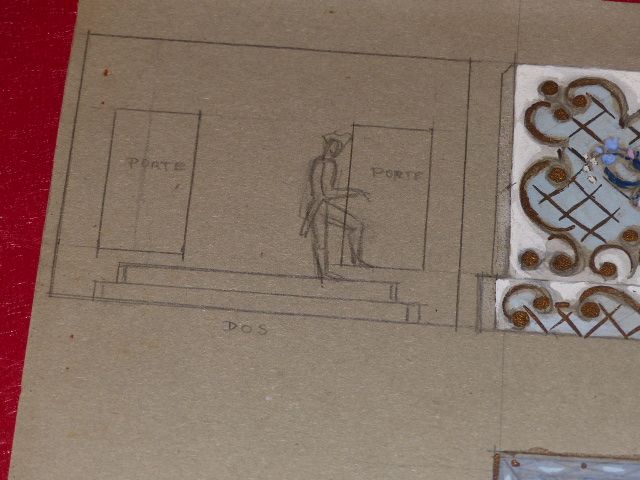
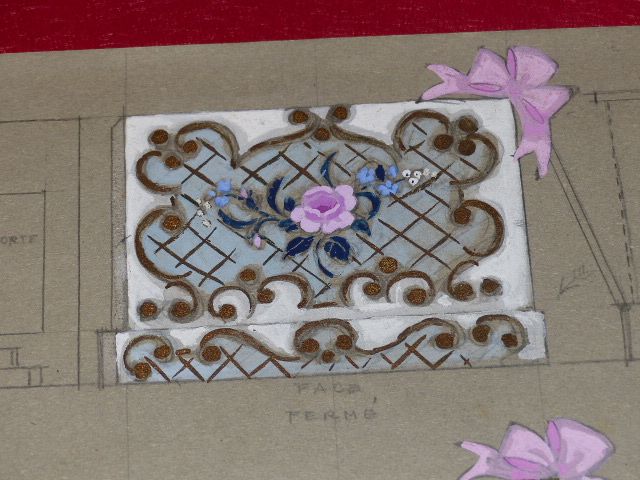
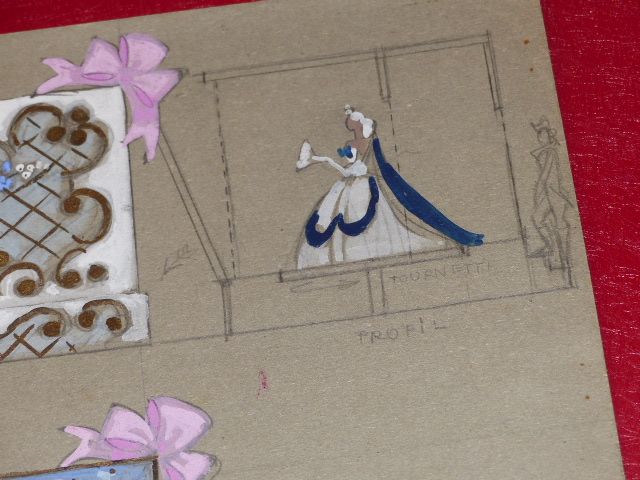

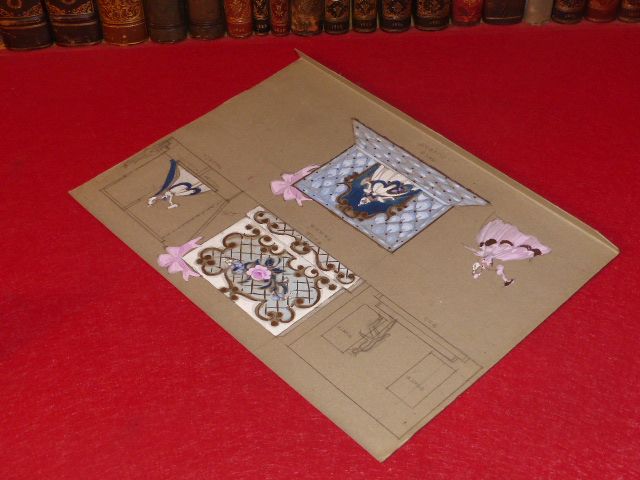
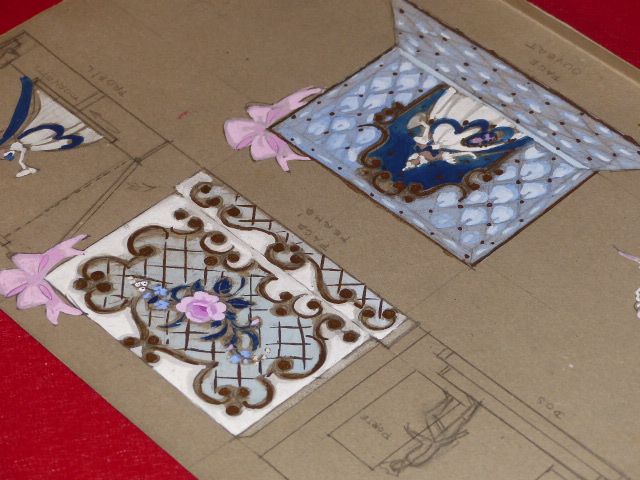
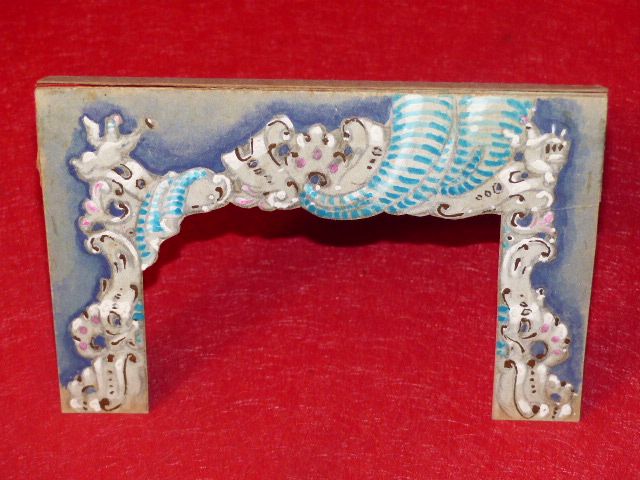
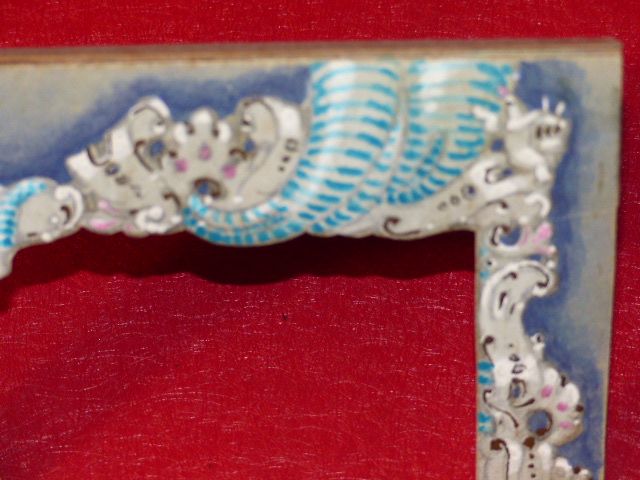
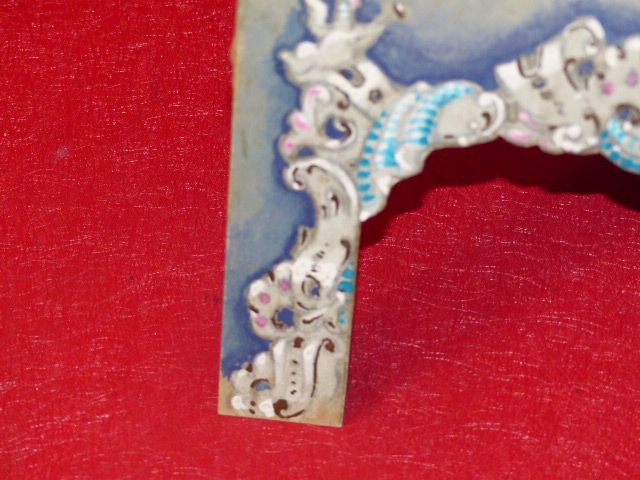
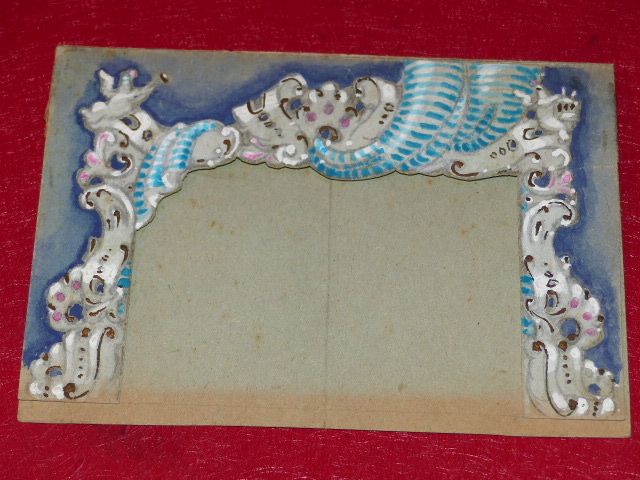

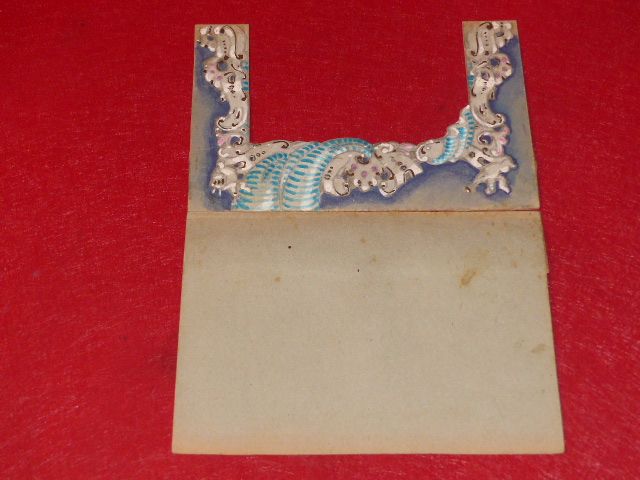
The Grand Duchess of Gerolstein
Jacques OFFENBACH
-
GRAND DUCHESS OF GEROLSTEIN (THE)
Work sheet
The Grand Duchess of Gerolstein
.
THE GRAND DUCHESS OF GEROLSTEIN
Jacques Offenbach
1819 – 1880
1867.
The Empire is at its peak. The exhibition opens its doors on April 1 and the public will be able to admire the progress of commerce and industry. Visitors, especially foreigners, also come to have fun, thanks to Paris, its theaters, its restaurants, its little women... Jacques Offenbach is at the height of his glory.
The triumph of La Belle Hélène (1864) and La Vie Parisienne (1866)
are still on everyone's minds.
At the end of 1866, Offenbach and his two accomplices, Meilhac and Halévy, set to work and prepared La Grande Duchesse de Gérolstein which was presented on the Variétés stage at the opening of the exhibition.
The Grand Duchess of Gerolstein
Hortense Schneider
With this opera buffa, Offenbach and his authors parody, under a frivolous appearance, the small European courts and the Army, or rather the distorted military spirit and the immoderate love of the stripe. After the unfortunate Mexican expedition (1862-1867)
and the defeat of Austria at Sadova (1867), the criticisms contained in The Grand Duchess take on more importance than they seem at first glance.
Rehearsals are taking place in good conditions. Hortense Schneider, satisfied with her role, controls her nerves and does not create a serious incident. On the other hand, when the curtain rises for the first performance, she learns that the censorship considers that the fanciful Grand Cordon and Cross that she must display on her costume risks being an affront to the Emperor. We ask her to remove these decorations.
The JEUNE woman becomes angry, sobs, refuses to play... Offenbach, without losing his head, orders the conductor to attack the overture.
A few moments later, Hortense enters the scene, with dried eyes, a smile on her lips, and without the Cordon. Certainly, some historians remain skeptical about the veracity of this anecdote. Legend or not, the following year we could admire
the portrait of the diva, painted by Pérignon.
On the costume, she proudly displayed her beautiful decoration.
The Grand Duchess of Gerolstein
After a few performances, during which the authors made some essential adjustments, Paris gave a triumphant welcome to The Grand Duchess, to Offenbach, Meilhac, Halévy and Hortense Schneider who became the true queen of Paris.
A parade of Emperors, Kings and Princes from all countries come to acclaim him and pay their respects. These crowned heads treat her like a true Grand Duchess. There are so many of these kings paying court to him that the scandalous chronicle is having a field day. Léa Silly, her close enemy (with whom she had constantly argued at the time of La Belle Hélène), nicknamed Hortense “the passage of princes”. Bad perhaps, but probably not always wrong.
Soon, La Grande Duchesse was performed all over the world.
There are several revivals of La Grande Duchesse de Gérolstein in Paris. Paola Marié (1878), Anna Judic (1887), Jeanne Granier (1890) and near us Germaine Roger (1948), Suzanne Lafaye (1966), Régine Crespin (1981) sang the role created by
Hortense Schneider.
After 1890, Le "Bruyas" does not report any series of performances in the capital,
of Offenbach's opera buffa, before the revival (in a new version deeply
reworked and “arranged”) from the Gaîté-Lyrique (October 1948).
Renewing their experience of 1942 with The Hundred Virgins, Albert Willemetz and André Mouezy-Eon wrote on this occasion a New version from Offenbach's work baptized The Grand Duchess.
The roles of Wanda and the Grand Duchess are played by the same artist
(Germaine Roger). Fritz becomes Frantz (Jacques Jansen).
In February 1949, the work was withdrawn from publication.
A tour takes place in Monaco and at the Grand Théatre de Genève
THE ARGUMENT
(in the original 1867 version):
The action takes place around 1720 in the imaginary Grand Duchy of Gérolstein.
Act I: The camp of the soldiers of the Grand Duchy
While waiting for their departure for the war, the soldiers of the Grand Duchess of Gérolstein sing and dance gaily with the peasant women and vivandières. Boum, the general in chief, soon interrupts the party. It is Fritz, the most handsome, and undoubtedly the most naive of the riflemen, whom he accuses of being responsible for the ruckus. It is true that Boum and Fritz are fighting for little Wanda's heart. The general has difficulty accepting that the handsome soldier
be preferred to him by the JEUNE girl.
The sovereign is twenty years old and bored. Boom and Baron Puck, who in fact share power, fear the appearance of a favorite. To distract her, they declare war and look for a husband for her. But Prince Paul, the chosen suitor, a ridiculous JEUNE man, leaves the Grand Duchess indifferent. She even refuses to receive Baron Grog, extraordinary envoy from Prince Paul's father, whose mission is to persuade her to marry.
That day, the Grand Duchess came to review her troops before their departure for the war. She notices the handsome soldier Fritz. Despite Boum's visible bad mood, she makes him climb all the ranks of the military hierarchy in just a few minutes. The JEUNE man finds himself a general, he challenges the tactics proposed by Boum for the campaign which is opening. Her own plan is retained by the sovereign. She appoints him general in chief and entrusts him with her father's saber.
Act II: A room in the Ducal Palace
The campaign is over. Fritz achieved victory by making his enemies drunk. He returns as a great triumphant. Boom, Puck, Prince Paul look grim and plot against the almost favorite. Everyone (except the person concerned) realizes that the sovereign is in love with her handsome conqueror... Her rank does not allow her to declare herself openly, she confides in him in secret. Fritz doesn't understand anything and even, a few moments later, goes so far as to ask her permission to marry Wanda. This is too much. The Grand Duchess, furious, joins the conspirators.
Act III: 1st scene: The red room
The conspirators meet and are ordered to teach General Fritz a good lesson. On this occasion, the Grand Duchess met Baron Grog. His handsome presence impressed the sovereign favorably. The Baron took the opportunity to plead the cause of his Prince and ended up winning the decision. The Grand Duchess and Prince Paul will marry within the hour.
Newlyweds, Fritz and Wanda don't stay alone for long. On the orders of the Grand Duchess, the general-in-chief is asked to mount his horse and go to meet the enemy who is making an offensive return.
2nd painting: The camp of the soldiers of the Grand Duchy
Prince Paul and the Grand Duchess have been married for a few moments when Fritz returns in a pitiful state, his sovereign's father's saber all twisted. In fact, Puck sent him to a lady whom he "visits" regularly in the absence of the husband, not ignoring that the latter was starting to have suspicions. Fritz came across the husband who, mistaking him for his wife's lover, gave him a serious beating.
The Grand Duchess is satisfied. General Fritz's unspeakable conduct allows him to be demoted. He finds himself a simple rifleman like before. She even accepts his resignation from the army.
Finally ! She will be able to dispose of the honors in favor of Baron Grog whom she regards with more and more benevolence; upon learning that he is married and the father of four children, she has a moment of discouragement. Finally resigning herself, she returns ranks and honors to General Boum and decides to try, since she cannot have what she loves, to love what she has. A good girl at heart, she appoints Fritz schoolmaster in her village: so, at least, he will be able to learn to read!
THE PARTITION :
Act I: Soldiers' Chorus “Waiting for the hour to strike”, Fritz's song “Come on, young girls, dance and spin”, Verses “Stride on discipline” (Boom), Duo “Here I am, here I am” (Wanda, Fritz); Rondo “Ah! that I love the military” (the Grand Duchess); Regimental song “Ah! it’s a famous regiment” (The Grand Duchess, Fritz); Chronicle from the Gazette de Hollande “To marry a Princess” (Prince Paul); Final I: Chorus of the soldiers “They are all going to leave”, Couplets of the Saber “Here is my father's sabre” (the Grand Duchess), Departure of the army “You can without terror” (all).
Act II: Intermission; Chorus of the bridesmaids “At last the war is over”, Couplets from the letters “I have you on my heart”; Chorus “After Victory”; Rondo “In very good order we left” (Fritz); Duetto and Declaration “Yes, general… Tell him we noticed him” (Fritz, The Grand Duchess); Food Trio and Ballad “Don’t you guess… Max was a soldier of fortune” (Boum, Puck, Paul); Melodrama and finale “Let’s lodge him then” (The Grand Duchess, Boom, Puck, Paul)
Act III, 1st scene: Duetto “O great lessons from the past” (The Grand Duchess, Boum); Conjuration “Get out of this corridor”, Song of the grinders “Turn, turn the cranks”, (the conspirators); Wedding song “We bring the JEUNE woman”, Nocturne “Good night, sir”; Verses of the bride and groom “Must it, my God, that I be stupid” (Vanda, Fritz); Serenade (backstage choir); Together “On horseback, quickly, Mr. General”
2nd painting: Entr’acte-galop; Wedding choir “At meal as in battle”; Legend of the glass “He was one of my ancestors” (The Grand Duchess, choir); Fritz returns and laments “Well, Highness, here I am!” » ; Finale III “Finally I took back the panache” (all)
